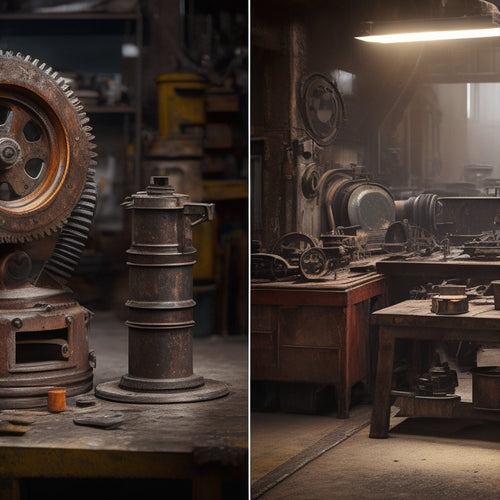
What Are the Best Commercial Solar Panels for Business
Share
When selecting the best commercial solar panels for your business, you'll want to take into account top brands with a proven track record of quality and customer satisfaction. Energy output and efficiency are also essential, with factors like wattage rating, panel efficiency, and low-light performance impacting performance. Durability and weather resistance are important, as well as cost and return on investment, including upfront expenditures and financing options. Effective installation and maintenance are significant, along with compatibility with existing systems and compliance with certifications and standards. By evaluating these factors, you'll be well on your way to finding the right commercial solar panels to meet your business's unique energy needs and maximize ROI - and there's more to investigate in making an informed decision.
Key Takeaways
- Top brands with a proven track record of quality, innovation, and customer satisfaction ensure peak performance and ROI for commercial solar panels.
- High-efficiency solar panels with optimal energy output, temperature coefficient, and low-light performance are critical for maximizing energy production and savings.
- Durable solar panels with high-quality materials, weather resistance, and corrosion protection ensure longevity and minimize maintenance costs.
- A comprehensive evaluation of upfront costs, financing options, and long-term savings potential is essential for determining the best commercial solar panels for business.
- Ongoing monitoring, maintenance, and support are crucial for optimizing energy output, reducing downtime, and maximizing ROI from commercial solar panel investments.
Top Brands for Commercial Solar
When investing in a commercial solar panel system, selecting a dependable brand is crucial to guarantee peak performance and return on investment. You need a brand that can provide high-quality products and services to assure your system operates at its best.
A brand's reputation is a critical factor to evaluate, as it reflects their commitment to quality, innovation, and customer satisfaction. Look for brands with a proven track record of providing successful projects and meeting customer needs.
Customer reviews are also an important resource when assessing top brands for commercial solar. They offer perspectives into the brand's performance, reliability, and customer support. You can learn about the brand's strengths and weaknesses, as well as any potential issues or concerns.
Energy Output and Efficiency
As you evaluate commercial solar panels, energy output and efficiency become critical factors in determining the system's overall performance. You want to verify that your solar panel system can generate enough electricity to power your business operations while minimizing energy waste.
When it comes to energy output, you should take into account the wattage rating of each solar panel. A higher wattage rating generally indicates higher energy output. However, it's crucial to take into account other factors such as panel efficiency, temperature coefficient, and low-light performance to get a thorough understanding of the panel's energy output.
Some key considerations for energy output and efficiency include:
-
The type of solar panel technologies used, such as monocrystalline, polycrystalline, or thin-film, which affect energy conversion rates.
-
The compatibility of the solar panel system with energy storage solutions, such as batteries, to optimize energy usage during peak hours.
-
The system's ability to monitor and track energy output in real-time, allowing for data-driven decisions to optimize performance.
Durability and Weather Resistance
The solar panels you choose for your business must be able to withstand various environmental conditions, from scorching heat to freezing temperatures, and everything in between. You need panels that can resist corrosion, moisture, and physical stress to guarantee a long lifespan and peak performance.
Material quality plays a significant role in determining the durability of your solar panels. Look for panels made from high-quality materials that can withstand extreme weather conditions. The anodized aluminum frame, tempered glass, and weather-resistant sealants all contribute to the panel's durability.
The installation environment also affects the panel's durability. You should consider factors such as wind speed, snow load, and humidity when selecting your panels. Ascertain that your panels are designed to operate efficiently in your local climate conditions.
Cost and Return on Investment
You're likely considering the financial implications of installing commercial solar panels, and rightfully so.
Your upfront system costs will depend on factors like panel efficiency, installation size, and local labor rates.
However, it's the long-term savings potential that can make commercial solar a smart business decision, and it's crucial to weigh these costs against the benefits.
Upfront System Costs
Nearly 80% of commercial solar panel installation costs stem from upfront system expenditures. As a business owner, understanding these costs is essential in determining the feasibility of investing in solar energy. The upfront system costs include the purchase and installation of solar panels, inverters, mounting structures, and other necessary equipment.
Some of the key factors that influence upfront system costs are:
-
System size and complexity: Larger systems with more complex designs require more materials and labor, increasing costs.
-
Panel quality and efficiency: High-efficiency panels with higher power output cost more than standard panels.
-
Installation company and labor costs: The experience and reputation of the installation company, as well as local labor costs, can greatly impact upfront costs.
Fortunately, there are ways to mitigate these costs. You can investigate financing options, such as power purchase agreements or solar loans, to spread the cost over time.
Additionally, tax incentives, like the Solar Investment Tax Credit (ITC), can help reduce the upfront burden. By understanding upfront system costs and investigating available financing options and incentives, you can make an informed decision about investing in commercial solar panels for your business.
Long-Term Savings Potential
Commercial solar panels offer an enticing long-term savings potential, with a significant return on investment (ROI) that can benefit your business's bottom line. You'll generate free electricity and reduce your reliance on the grid, resulting in substantial energy savings over time.
The cost of solar panels decreases over their lifespan, making them a smart investment for your business. You can further maximize your ROI by taking advantage of tax incentives, such as the 30% federal solar investment tax credit (ITC).
Additionally, various financing options are available, including power purchase agreements (PPAs) and solar loans, which can help offset the upfront costs of installation. By locking in a fixed energy rate, you'll be protected from rising electricity prices, ensuring predictable energy expenses for years to come.
With a typical commercial solar panel system lasting 25 years or more, you'll reap the benefits of long-term savings and a strong ROI, making your business more competitive and profitable in the process.
Installation and Maintenance Needs
You'll need to evaluate system design requirements that guarantee ideal energy production and meet local building codes.
Once installed, you'll want to monitor energy output to identify potential issues and enhance performance.
Ongoing support needs, including maintenance and repairs, should also be factored into your decision-making process.
System Design Requirements
When designing a commercial solar panel system, guaranteeing it meets specific installation and maintenance requirements is essential to enhance energy production and minimize downtime.
You'll need to evaluate various factors to confirm your system operates at peak performance.
Some key considerations include:
-
System orientation: The angle and direction of your solar panels can greatly impact energy production. A south-facing orientation is typically ideal, but this may vary depending on your location and surrounding environment.
-
Shading analysis: Analyzing potential shading from trees, buildings, or other obstructions is critical to determine the best panel placement and system design.
-
Accessibility for maintenance: Ascertain that your system is easily accessible for routine maintenance and repairs to minimize downtime and reduce costs.
Energy Output Monitoring
With energy output monitoring, your business can keep a finger on the pulse of its solar panel system's performance, identifying potential issues before they escalate into costly problems.
This real-time monitoring allows you to track energy production, consumption, and storage, ensuring peak energy management. By analyzing performance data, you can pinpoint inefficiencies, detect faults, and schedule maintenance during off-peak hours, minimizing downtime.
Advanced monitoring systems provide granular data on each panel's performance, enabling you to identify underperforming units and prioritize repairs.
This performance tracking capability helps you enhance energy output, reduce energy waste, and maximize returns on your investment. In addition, energy output monitoring enables you to make data-driven decisions about energy storage, load management, and grid connection.
By leveraging this data, you can refine your energy strategy, reduce energy costs, and increase your bottom line.
With energy output monitoring, you'll have the understanding needed to enhance your commercial solar panel system and drive business success.
Ongoing Support Needs
Optimizing energy output monitoring is just the beginning - a commercial solar panel system requires ongoing support to guarantee consistent performance and maximize returns.
You need to take into account the installation and maintenance needs of your system to make certain it operates at peak efficiency. Ongoing maintenance is vital to identify and address potential issues before they impact your energy output and bottom line.
When evaluating commercial solar panels, look for providers that offer extensive customer support, including:
- Regular system checks and maintenance schedules to prevent downtime and optimize energy production
- Dedicated customer support teams available to address technical issues and provide guidance on system optimization
- Remote monitoring and troubleshooting capabilities to quickly identify and resolve issues, minimizing the need for on-site visits
Compatibility With Existing Systems
Commercial solar panels must integrate seamlessly with your existing electrical infrastructure to guarantee a hassle-free switch to renewable energy.
When evaluating commercial solar panels, you need to take into account system integration options that secure a smooth changeover. This involves examining the compatibility of the solar panels with your existing electrical system, including inverters, meters, and distribution panels.
You'll want to conduct compatibility evaluations to identify potential issues before installation. This includes analyzing the electrical characteristics of your existing system, such as voltage, current, and power quality, to confirm the solar panels can safely and efficiently integrate with your infrastructure.
A thorough analysis will help you identify potential upgrades or modifications needed to guarantee a seamless integration. By taking into account system integration options and conducting compatibility evaluations, you can secure a successful switch to renewable energy and maximize the benefits of your commercial solar panel installation.
Certifications and Compliance Standards
Meeting stringent certifications and compliance standards is essential when selecting commercial solar panels for your business. You need to confirm the panels meet the required standards to guarantee safety, efficiency, and reliability.
Failure to comply with these standards can lead to subpar performance, safety risks, and even void your warranty.
When evaluating certifications, look for reputable certification bodies such as UL (Underwriters Laboratories) and IEC (International Electrotechnical Commission). These bodies set standards for safety, performance, and environmental sustainability.
Additionally, verify the panels comply with local and national compliance regulations, such as those set by OSHA (Occupational Safety and Health Administration) and the NEC (National Electric Code).
Some key certifications and compliance standards to look for include:
- UL 1703: Standard for Safety for Flat-Plate Photovoltaic Modules and Panels
- IEC 61215: Terrestrial Photovoltaic (PV) Modules – Design Qualification and Type Approval
- NEC Article 690: Solar Photovoltaic Systems
Frequently Asked Questions
Can I Use Commercial Solar Panels for Residential Purposes?
Cutting through the noise, you'll find commercial solar panels can serve residential purposes, but consider this: you're likely paying for more panel efficiency than you need, as residential solar requirements are generally less demanding.
Do Solar Panels Require Regular Cleaning for Optimal Performance?
You'll need to prioritize panel maintenance to guarantee optimal performance; cleaning frequency depends on environmental factors, but as a general rule, you should clean your solar panels every 6-12 months to maximize energy output and reduce potential losses.
Are Commercial Solar Panels Compatible With Energy Storage Systems?
You'll be pleased to know that most commercial solar panels are designed to work seamlessly with energy storage systems, ensuring ideal solar panel efficiency and maximizing your power output when you need it most.
Can I Install Commercial Solar Panels on a Metal Roof?
When you install commercial solar panels on a metal roof, you'll face unique installation challenges, requiring specialized brackets and considerations for roof penetrations, structural integrity, and waterproofing to guarantee a secure and efficient energy-harvesting system.
Do Solar Panels Generate Noise or Electromagnetic Interference?
As you utilize the sun's energy, you might wonder: do solar panels create a ruckus or disrupt the airwaves? Rest assured, they're whisper-quiet and electromagnetically silent, ensuring maximum solar panel efficiency without added installation costs or noise pollution.
Related Posts
-

Why Higher Upfront Costs Are Worth It
You pay a premium for high-quality, energy-efficient products, but they're worth it. With durability testing ensuring...
-

Step-by-Step Guide to Converting Your Vehicle to EV
You'll begin by evaluating your vehicle's conversion potential, analyzing its weight, aerodynamics, and powertrain co...
-

What Makes a Road Bike-Friendly by Design?
As you plan and design roads, incorporating features like dedicated bike lanes, smooth surfaces, and traffic calming ...


